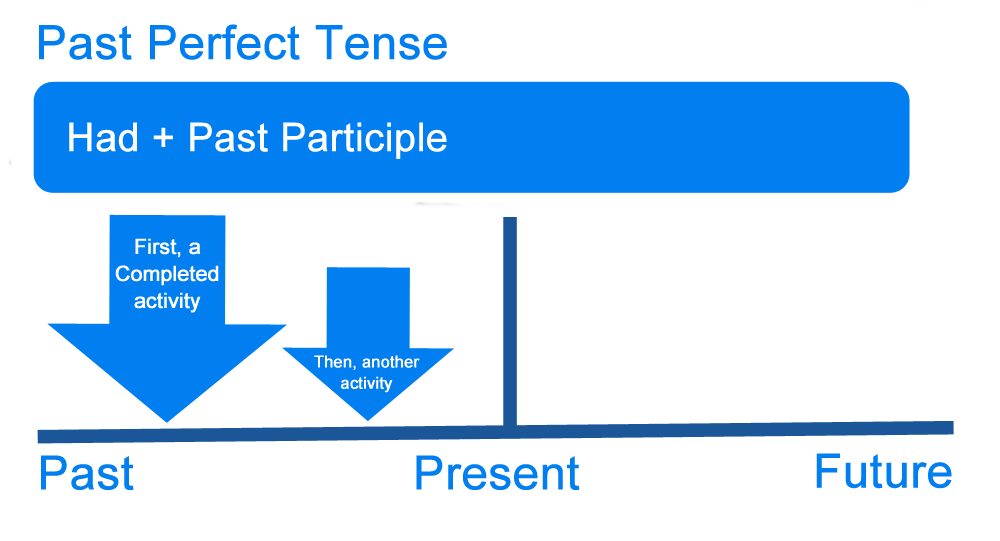Past perfect tense definition: The past perfect tense is a verb tense used to express actions that occurred in the past that finished before another action in the past started.
What is the Past Perfect Tense?
The past perfect one of the four verb forms of the past tense. It is used for actions that started and finished in the past before another action started. That other action also occurred in the past.
Because the past perfect is a part of the “perfect” tense, it expresses completed actions. That is, the action that started in the past is finished, or complete.
To form the past perfect:
- Subject + had + past participle of verb

Past Perfect Examples
The past perfect tense is used to express a few different things.
The past perfect is used to express:
- completed action before another begins (both in past)
- After we had purchased tickets, we were able to enter the venue.
- actions of duration before something in the past
- I had attended the event for years without ever having to purchase tickets.
- conditional statements
- If had purchased tickets, we would have been able to enter the venue.
- reported speech
- The official asked if we had purchased tickets.
- show dissatisfaction with the past
- We wished we had purchased tickets.
What is it Used For?
Let’s look at some additional past perfect tense example to fully understand its many uses.
For actions completed before another begins (both in past):

- I had never flown in an airplane before I went to London.
- After she had attended college, she became a police officer.
- They had forgotten the answer until the teacher reminded them.
These examples indicate that the action began and ended in the past. Furthermore, they began and ended BEFORE a second event occurred. That second event is also in the past.
For actions of duration before something in the past:

- I had attended the event for years without ever having to purchase tickets.
- He had admitted his fault to her repeatedly.
- They would have never known the truth without investigating.
These examples indicate that the action began and ended in the past. Additional, the event also lasted for a period of time (duration) but has now ended.
For actions expressing conditional statements:
- If I had listened during class, I would have passed the test.
- If you had understood me, you would not be asking questions.
- If we had called ahead, we would not have waited.
These examples indicate a conditional action that occurred in the past. The conditional action is a prerequisite to the consequence of the condition.
For reported speech:
- The boss had said it would be a long day.
- The child had wondered how many stars were in the sky.
- The student had asked another question.
These examples indicate speech that occurred in the past. Each of these actions is finished, or complete. It is possible that they occurred more than once or over a period of time.
For showing dissatisfaction with the past:
- I wished I had returned the item.
- He wished he had ordered a different meal.
- We wished we had brought our dog on vacation.
These examples indicate an event that did not happen actually happen. The speaker shows dissatisfaction with his decision (not stated in the sentence) and states the action he wishes had occurred.
Other Perfect Tenses
There are two other primary perfect tenses: the present perfect and the future perfect.
Present Perfect Tense
 What is the present perfect tense? The present perfect tense expresses actions that happened at time that is not specific and actions that started in the past but continue to the present.
What is the present perfect tense? The present perfect tense expresses actions that happened at time that is not specific and actions that started in the past but continue to the present.
To form the present perfect:
- Subject + has/had + past participle of verb
The present perfect is used to express:
- actions in the past of indefinite time
- I have lived in Brazil.
- actions that started in the past but continue to present
- They have listened to reggae since college.
- actions that started in the past but stopped recently
- We have landed.
Future Perfect Tense
 What is the future perfect tense? The future perfect tense expresses actions that will be finished at some point in the future.
What is the future perfect tense? The future perfect tense expresses actions that will be finished at some point in the future.
To form the future perfect:
- Subject + will have + past participle of verb
The future perfect is used to express:
- actions that will be finished at some point
- When we leave, the sun will have set.
- actions that occur in the future will continue beyond a certain point in the future
- We will have worked together for eight years in September.
Summary
Define past perfect tense: the definition of past perfect tense is the tense denoting that an action was completed before another specified past time or past action.
In summary, the past perfect tense is a verb from to express completed actions such as:
- actions before another begins (both in past)
- actions of duration before something in the past
- conditional statements
- reported speech
- dissatisfaction with the past
Contents
